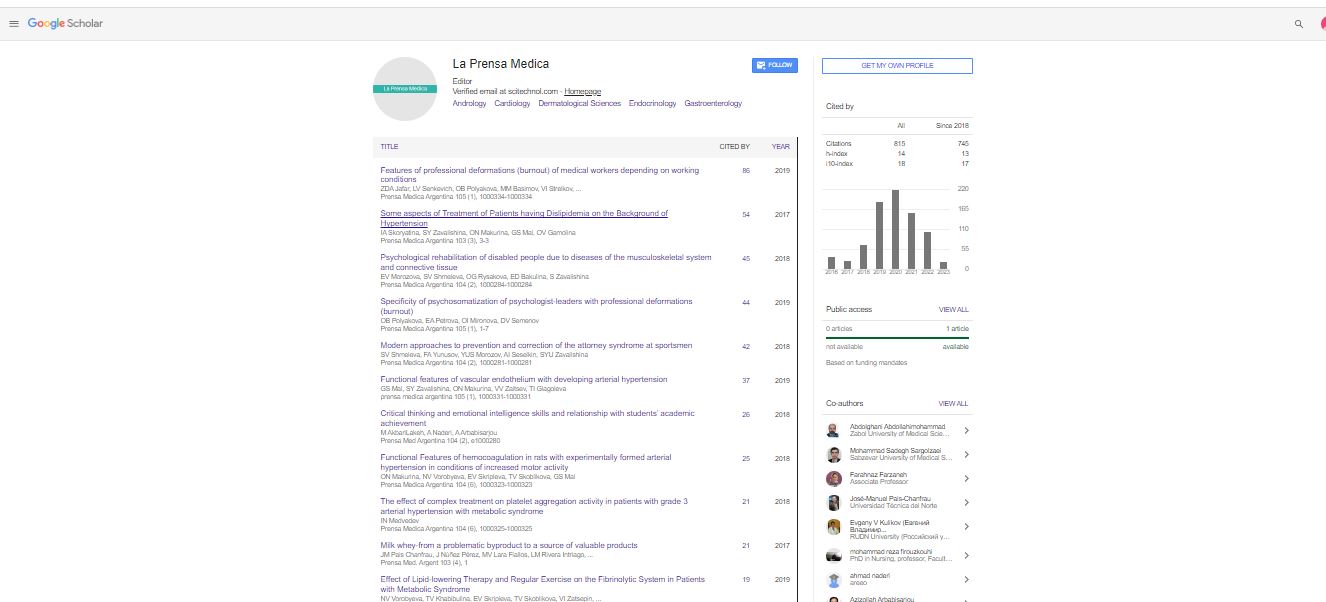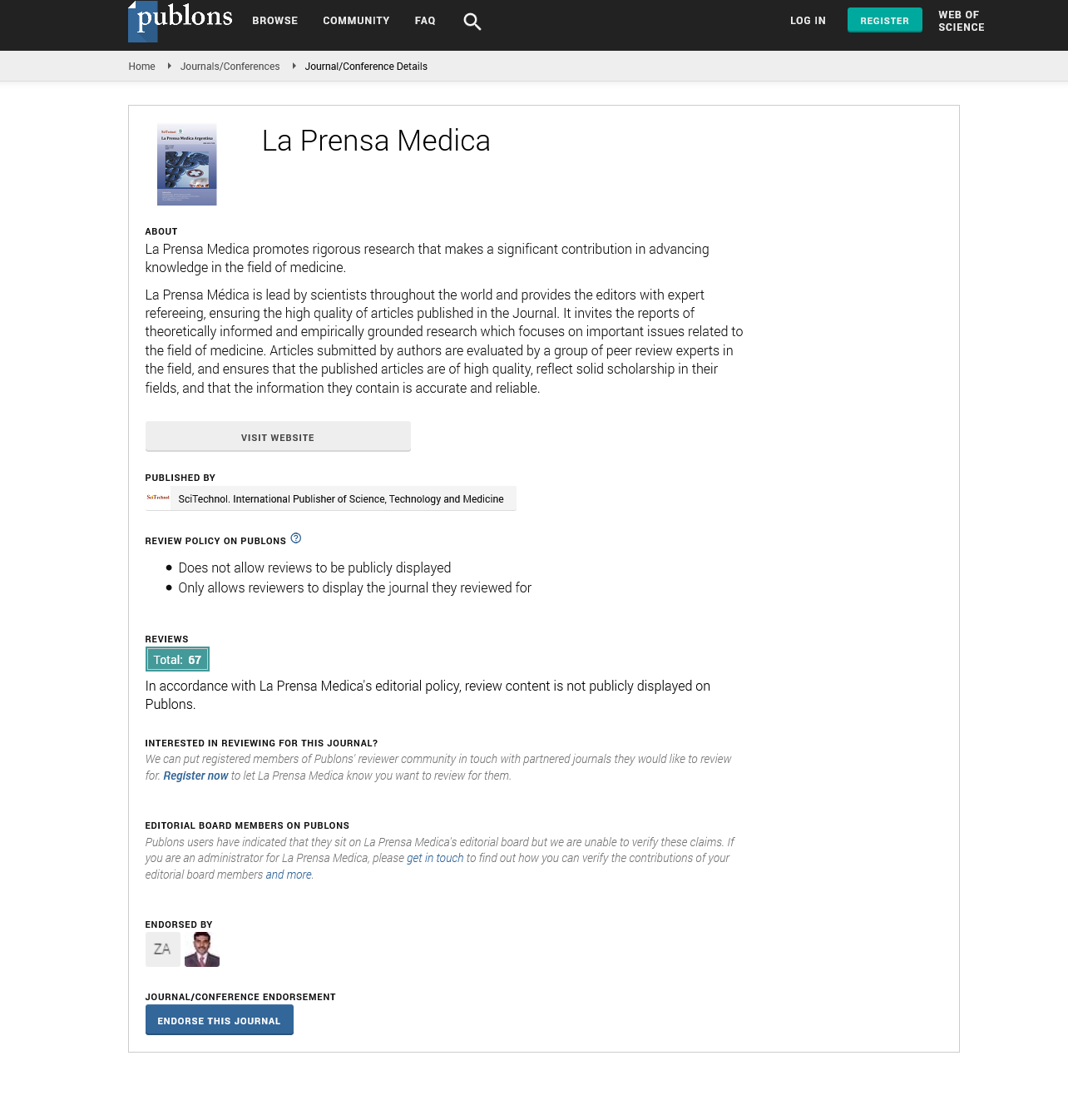Opinion Article, La Prensa Medica Vol: 109 Issue: 3
Connection Between Microbiota and Immune Response: An Overview
Denise Benech*
Department of Biology, University of Minho, Braga, Portugal
*Corresponding Author: Denise Benech
Department of Biology, University of Minho, Braga, Portugal
E-mail: benechd@bio.uminho.pt
Received date: 29 May, 2023, Manuscript No. LPMA-23-107133;
Editor assigned date: 31 May, 2023, PreQC No. LPMA-23-107133 (PQ);
Reviewed date: 15 June, 2023, QC No. LPMA-23-107133;
Revised date: 22 June, 2023, Manuscript No. LPMA-23-107133 (R);
Published date: 29 June, 2023, DOI: 10.4172/0032-745X.1000173
Citation: Benech D (2023) Connection Between Microbiota and Immune Response: An Overview. La Prensa Medica 109:3.
Abstract
Description
Host-microbe interactions are intricate relationships between the human body and the diverse communities of microorganisms that inhabit it. These microorganisms, collectively known as the human microbiota, include bacteria, viruses, fungi, and other microbes. The human microbiota plays a vital role in maintaining health and influencing various physiological processes. However, when the delicate balance between the host and microbes is disrupted, it can lead to pathogenesis and disease. This article explores the fascinating world of host-microbe interactions, focusing on the molecular basis of pathogenesis and immune responses.
The human microbiota: A complex ecosystem
The human body harbors a vast array of microorganisms, collectively referred to as the human microbiota. These microorganisms reside in various regions, such as the skin, mouth, respiratory tract, gastrointestinal tract, and urogenital tract. The human microbiota is a dynamic and complex ecosystem, with each region harboring a unique community of microbes. The gastrointestinal tract, in particular, hosts a diverse and abundant microbial community, often referred to as the gut microbiota. This gut microbiota plays a key role in nutrient metabolism, digestion, immune system development, and protection against pathogens. Imbalances in the gut microbiota, known as dysbiosis, have been associated with various diseases, including Inflammatory Bowel Disease (IBD), obesity, and metabolic disorders.
Pathogenesis: The molecular basis of microbial disease
Pathogenesis refers to the process by which microbes cause disease in the host. It involves the complex interplay between microbial virulence factors and the host's defense mechanisms. Microbes have evolved various strategies to evade the host's immune system and exploit the host's cellular machinery for their survival and replication. Virulence factors are molecules produced by microbes that contribute to their ability to cause disease. These factors can include toxins, adhesion proteins, and invasion proteins. For example, some bacteria produce toxins that damage host cells and tissues, leading to tissue destruction and inflammation. Other bacteria express adhesion proteins that enable them to attach to specific host cells, facilitating colonization and infection. In response to microbial infection, the host activates various defense mechanisms to combat the invading pathogens. The immune system plays a central role in recognizing and eliminating microbial threats. Innate immune responses are the first line of defense and involve the activation of immune cells, such as macrophages and neutrophils, to engulf and destroy pathogens. Adaptive immune responses, on the other hand, are more specific and involve the production of antibodies and the activation of T cells to target and eliminate specific microbes. Understanding the molecular basis of pathogenesis is essential for developing effective strategies to prevent and treat microbial diseases. Targeting microbial virulence factors or modulating host immune responses can offer potential therapeutic avenues for infectious diseases.
The gut microbiota and immune responses
The gut microbiota plays an important role in shaping the development and function of the host's immune system. During early life, the gut microbiota influences the maturation of the immune system, helping to establish immune tolerance to beneficial microbes and developing protective immunity against pathogens. Dysbiosis in the gut microbiota during censorious developmental periods may lead to an increased risk of immune-related disorders, such as allergies and autoimmune diseases. The gut microbiota communicates with the host's immune system through various molecular signaling pathways. Microbial molecules, such as lipopolysaccharides from gram-negative bacteria and peptidoglycan from gram-positive bacteria, can activate immune cells and trigger immune responses. These microbial molecules are recognized by Pattern Recognition Receptors (PRRs) on immune cells, such as Toll-Like Receptors (TLRs) and NOD-Like Receptors (NLRs). The crosstalk between the gut microbiota and the immune system is bidirectional, meaning that the immune system also influences the composition and function of the gut microbiota. Immune responses can shape the diversity and abundance of specific microbial species in the gut, creating a dynamic interplay between the host and the gut microbiota.
Impact of host-microbe interactions on health and disease
The dynamic and delicate balance of host-microbe interactions plays a significant role in health and disease. A harmonious interaction between the host and the microbiota supports essential physiological processes, such as nutrient absorption, metabolism, and immune system regulation. Conversely, dysbiosis in the microbiota has been implicated in the development of various diseases. For instance, dysbiosis in the gut microbiota has been associated with inflammatory bowel diseases, such as Crohn's disease and ulcerative colitis. Furthermore, imbalances in the vaginal microbiota have been linked to an increased risk of recurrent urinary tract infections and bacterial vaginosis.
Conclusion
Host-microbe interactions represent a fascinating and complex relationship that influences human health and disease. The human microbiota, particularly the gut microbiota, plays a big role in maintaining immune homeostasis and supporting various physiological functions. Understanding the molecular basis of pathogenesis and immune responses is essential for developing targeted therapies for infectious diseases and immune-related disorders. As research in t he field of host-microbe interactions continues to advance, it holds the hope of uncovering new therapeutic approaches that harness the power of the microbiota for personalized medicine and disease prevention. From the gut microbiome to the skin and beyond, the intricate interplay between the human body and its microbial inhabitants will undoubtedly continue to captivate researchers and clinicians.
 Spanish
Spanish  Chinese
Chinese  Russian
Russian  German
German  French
French  Japanese
Japanese  Portuguese
Portuguese  Hindi
Hindi 

